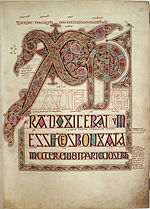Anglo-Latin literature is literature from originally written in Latin and produced in England or other English-speaking parts of Britain and Ireland....
7 KB (728 words) - 14:13, 21 April 2024
Anglo-Norman literature is literature composed in the Anglo-Norman language and developed during the period of 1066–1204, as the Duchy of Normandy and...
31 KB (4,619 words) - 07:32, 8 July 2024
English history. In addition to Old English literature, Anglo-Latin works comprise the largest volume of literature from the Early Middle Ages in England....
68 KB (8,015 words) - 05:24, 9 August 2024
Oxford Handbook of Medieval Latin Literature, Oxford: Oxford University Press. Lapidge, Michael. 1993. Anglo-Latin Literature 900–1066. London and Rio Grande...
37 KB (4,871 words) - 21:56, 25 July 2024
ISBN 978-90-04-12524-7. Anglo-Latin literature Anglo-Norman language Hermeneutic style Brithenig – a constructed language imagining if British Latin had displaced...
21 KB (2,588 words) - 02:52, 5 July 2024
British literature in the English language. Anglo-Saxon (Old English) literature is included, and there is some discussion of Latin and Anglo-Norman literature...
133 KB (16,605 words) - 01:16, 29 July 2024
produced the Principia, among other works, in Latin. This consists of medieval literature in the Anglo-Norman tongue, and also in French. The French epic...
6 KB (483 words) - 14:17, 10 June 2024
Anglo-Saxon literature came to an end and literature written in Britain was in Latin or Anglo-Norman. The Plantagenet kings encouraged this Anglo-Norman...
66 KB (8,358 words) - 22:43, 2 August 2024
Lapidge, an expert on medieval Latin literature, as "perhaps the most remarkable monument of tenth-century Anglo-Latin literature". It is "one of the most brilliantly...
72 KB (9,562 words) - 06:00, 5 August 2024
aspects of royal government, and the surviving works of Anglo-Latin and vernacular literature, as well as the numerous manuscripts written in the 10th...
177 KB (25,018 words) - 07:29, 6 August 2024
manuscript". Anglo-Saxon England. 42: 249–69. doi:10.1017/s0263675113000124. S2CID 161079836. Lapidge, Michael (1996). Anglo-Latin literature, 600–899. London:...
96 KB (10,932 words) - 21:29, 5 August 2024
(previously Anglo-Welsh literature) is a term used to describe works written in the English language by Welsh writers. The term 'Anglo-Welsh' replaced...
48 KB (6,610 words) - 09:22, 8 July 2024
list of literature pages categorized by country, language, or cultural group. Sometimes these literatures will be called national literatures because...
4 KB (42 words) - 11:25, 28 April 2024
later accompanied and eventually overtaken by the Old English Latin alphabet introduced to Anglo-Saxon England by missionaries. Futhorc runes were no longer...
36 KB (2,474 words) - 01:59, 9 August 2024
Charlemagne, Pierre Riche, page 205 Anglo-Latin Literature, 600–899, Michael Lapidge, page 63 Becoming a Poet in Anglo-Saxon England, Emily V. Thornbury...
3 KB (208 words) - 08:37, 12 October 2023
majority. Anglo is a Late Latin prefix used to denote English- in conjunction with another toponym or demonym. The word is derived from Anglia, the Latin name...
23 KB (2,419 words) - 07:33, 17 July 2024
Anglo-Saxon riddles are a significant genre of Anglo-Saxon literature. The riddle was a major, prestigious literary form in early medieval England, and...
18 KB (2,379 words) - 19:39, 13 December 2023
Old English (redirect from Anglo-Saxon language)
Celtic language; and Latin, brought to Britain by the Roman conquest. Old English had four main dialects, associated with particular Anglo-Saxon kingdoms:...
89 KB (8,221 words) - 19:17, 28 July 2024
Insular Latin may refer to: Anglo-Latin literature, written in England and throughout Britain, with an influence from English British Latin, used in Roman...
469 bytes (98 words) - 15:06, 25 September 2023
Encyclopedia Britannica. Retrieved 2021-01-25. Lapidge, Michael (1996). Anglo-Latin Literature, Vol.1, 600-899. Bloomsbury Publishing. p. 98. ISBN 978-1-4411-0105-1...
8 KB (858 words) - 19:26, 13 July 2024
Hermeneutic style (redirect from Hermeneutic Latin)
Lapidge, Michael (1975). "The Hermeneutic Style in Tenth-Century Anglo-Latin Literature". Anglo-Saxon England. 4. Cambridge, UK: Cambridge University Press:...
33 KB (4,551 words) - 01:01, 28 May 2024
Æthelweard (historian) (category Texts of Anglo-Saxon England in Latin)
Latin version of the Anglo-Saxon Chronicle known as the Chronicon Æthelweardi. He was a kinsman of the royal family, being a descendant of the Anglo-Saxon...
12 KB (1,517 words) - 11:50, 4 April 2024
integrated, their language and literature mingled with that of the natives. The Norman dialects of the ruling classes became Anglo-Norman, and Old English underwent...
10 KB (1,344 words) - 07:34, 8 July 2024
lexicon, particularly after the Christianization of the Anglo-Saxons and the Norman Conquest. Latin and Ancient Greek roots are heavily used in English vocabulary...
101 KB (11,047 words) - 19:39, 8 August 2024
Michael Lapidge (category Elrington and Bosworth Professors of Anglo-Saxon)
February 1942) is a scholar in the field of Medieval Latin literature, particularly that composed in Anglo-Saxon England during the period 600–1100 AD; he...
10 KB (1,131 words) - 01:13, 1 June 2024
of Lindisfarne, was in Crayke. (For instance, Michael Lapidge in Anglo-Latin Literature 600–899, Hambledon Press, London 1996) According to the chronicler...
11 KB (1,153 words) - 12:04, 4 July 2024
Æthelstan A (category Anglo-Saxon writers)
diplomas are written in elaborate Latin known as the hermeneutic style, which became dominant in Anglo-Latin literature from the mid-tenth century and a...
30 KB (3,135 words) - 21:50, 20 October 2023
literature and modern paganism. The word pagan is a Latin pejorative term that was used by Gentile Christianity (also: Pagan Christianity) in Anglo-Saxon...
111 KB (15,002 words) - 08:44, 3 August 2024
Edmund I (category Articles containing Latin-language text)
Anglo-Saxon England (Second ed.). Chichester: Blackwell Publishing. p. 277. ISBN 978-0-4706-5632-7. Lapidge, Michael (1993). Anglo-Latin Literature 900–1066...
82 KB (10,778 words) - 16:24, 1 July 2024
Introduction to the Corpus of Anglo-Latin Literature". In Philip Pulsiano; Elaine Treharne (eds.). A Companion to Anglo-Saxon Literature (Paperback ed.). Malden...
52 KB (6,761 words) - 20:03, 17 July 2024














